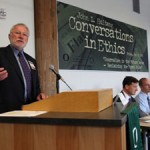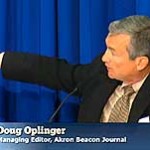Resource:
Kent State Media Law Center for Ethics and Access

- Links: Website | Twitter | Facebook | Archive of Ethics Workshops | Resources
- Tags: Academy, Education, Ethics, First Amendment, Journalism Education, Law, Research, Training
The Media Law Center for Ethics and Access, originally named the Center for Privacy and the First Amendment, offers workshops and seminars in media ethics and access to government information. It provides advice and counsel for anyone — journalists, government officials or members of the public — with questions about ethics or access or related media law concerns. The Center was founded in 1991 to provide information and research on accessing government records and meetings. It was expanded in 2007 to include ethics training and to address issues of access and ethics in online journalism.” Source: Kent State University Media Law Center for Ethics and Access
Each September, the Poynter Institute and the Media Law Center for Ethics and Access at Kent State University host an annual ethics workshop. Topics and discussions are relevant to current trends in the media and journalism education. Presenters and panelists from varying backgrounds provide information and opinions based on personal industry experience.” Source: Kent State University Media Law Center for Ethics and Access
The Journalism Accelerator is not responsible for the content we post here, as excerpts from the source, or links on those sites. The JA does not endorse these sites or their products outright but we sure are intrigued with what they’re up to.











Weigh In: Remember to refresh often to see latest comments!
9 comments so far.
-
 Emily Harris says:
Emily Harris says:
September 21, 2012 at 11:45 am
-
 Dan Moulthrop says:
Dan Moulthrop says:
September 24, 2012 at 9:33 am
-
 Emily Harris says:
Emily Harris says:
September 14, 2012 at 1:58 pm
-
 Emily Harris says:
Emily Harris says:
September 14, 2012 at 1:58 pm
-
 Dan Moulthrop says:
Dan Moulthrop says:
September 16, 2012 at 6:44 pm
-
 Dan Moulthrop says:
Dan Moulthrop says:
September 16, 2012 at 6:47 pm
-
 Dan Moulthrop says:
Dan Moulthrop says:
September 17, 2012 at 12:19 pm
-
 Dan Moulthrop says:
Dan Moulthrop says:
September 17, 2012 at 12:23 pm
-
 Dan Moulthrop says:
Dan Moulthrop says:
September 17, 2012 at 12:27 pm
| ParticipantsOkay, Kent State 2012 was a great workshop. Very inspiring. Next Tuesday, here on the JA, we’re continuing the conversation, digging deeper into the challenges social media present in political reporting. Poynter’s Ellyn Angelotti will join us. We’ll touch on these issues and more:
What should you ask yourself before you tweet a juicy political bite? With the growing pressure to brand and engage, how much of yourself should you reveal on your personal/professional networks? How and when should you jump into a comment thread on your news site or on Facebook? How should you investigate and contextualize in your reporting small online groups that have a big voice?
Share here ethical questions around social media that have come up in your work. This is the first of four online discussions to lay the ground work for a new ethics best practices guide to political reporting.
Looking forward to this conversation!
This year (2012), the Poynter Kent State Media Ethics Workshop takes on political coverage – a frequent trigger of reporting and online responses that add more heat than light. The JA is excited to partner with Poynter, Kent State, The Civic Commons and participants at this year’s workshop to kickoff a new ethics best practices guide to political coverage.
We’re starting right here: asking for examples of reporting you’ve done or seen that raised ethical issues – including civility, accuracy, transparency (in reporting, social media and in campaigning). This 20-year-old column, focused on Australian politics, asserts a theory worth considering in political coverage today: “The media can have a very positive effect on the motivation of politicians who are struggling to improve the standard of their conduct.” Should we? And if so, how?
Here is one typical example of on-the-trail coverage: Obama “touts” a U.S. lawsuit accusing China of unfair trade practices and “taunt[s] Romney for gaps in his deficit-cutting promises.” The story also focuses on a newly surfaced video of Romney at private donor event.
A few hours after the AP story went up on the Washington Post website, the 50-some comments included one commenter calling another an “Idiot or a fool from France,” another accuses “you liberal idiots” of “just throw[ing] around meaningless phrases.” There’s this barb too: “You just have a terrible candidate – nothing personal.” And the reply: “You have a horrible president.”
Are there ways political reporting could bridge the divide? Is there an ethical obligation to do so?
In addition to civility and responses to coverage, other ethical issues in election season might come up around fact-checking, transparency of interests (of supporters, candidates, and journalists), and political ads.
Share your examples of either unmet ethical challenges or great practices in political coverage, and help lay the groundwork for a new ethics guide.
I’m a big fan of the work of Ta-nehisi Coates at The Atlantic, particularly how he fosters community among commenters and shuts down conversations when they’re about to go off the rails.
One of the most illustrative examples of a twitter meltdown came from Politico reporter Dave Catanese in the wake of Todd Akin’s public misunderstanding or rape and biology.
The folks on The Plain Dealer’s editorial board have had some good success with this mapping tool which allows members of the community to create their own revisions to the current municipality map of Cuyahoga County.
The Brian Lehrer show crowd-sourced a map of the price of milk to find out if consumers were being gouged.
Here’s one we did: a forum for candidates for the county prosecutor in Cuyahoga County.